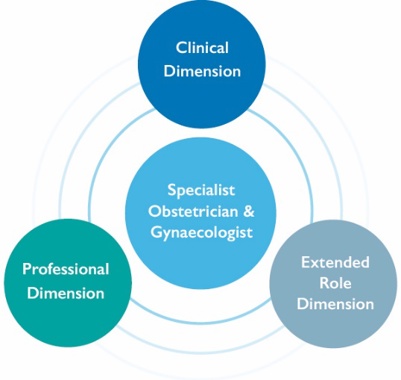It is recommended that you provide this guidance to your appraiser, in advance of appraisal, in particular if they are not obstetricians and / or gynaecologists
The aim of the new RCOG CPD framework is to ‘…enable specialists in obstetrics and gynaecology to maintain and develop their clinical and wider professional skills in order to ensure that their patients1 receive the best and safest care from them and their teams’. The framework supports specialists2 in O&G in their professional development across the scope of their work, focussing on generic, non-technical as well as clinical and technical skills.
The framework is based on a learning process with four stages:
- Planning
- Learning Event
- Reflection
- Action
Personal Learning Plan
The starting point of the learning process is the development of a Personal Plan. This has two components:
- Practice and Roles (P&R): all the areas of clinical and non-clinical practice of the specialist
- Personal Learning Plan (PLP): an agenda for learning for the forthcoming appraisal year that will be reviewed at completion of the appraisal year. New learning goals that arise between appraisals can also be added to the PLP.
The components of the PLP are:
- what: what do I want to learn?
- why: what will the benefit and/or outcome of my learning be?
- how: what do I have to do? What support do I need?
- when: what is the timescale for achievement?
- review: have I achieved what I planned?
What / why / how / when are completed together at the start of the appraisal year but Review can be completed at any time prior to the next appraisal.
It is recognised that specialists will often undertake aspirational learning in order to prepare them to develop their clinical practice or undertake extended roles. This aspiration may be part of the specialist’s PLP while it may not form part of the current practice and roles. It can also be linked to the Dimension of CPD.
During appraisal the previous Personal Plan should be reviewed. It is expected that all areas of the P&R and PLP should have evidence of linked CPD. At completion of the appraisal the new Personal Plan should be agreed between appraiser and appraisee. When relevant CPD has not been achieved for all areas of the Personal Plan, this should be discussed during appraisal and, if appropriate, items can be carried forward into the PLP for the following year.
Three dimensions of Professional Identity
The CPD dimensions describe the components of the professional identity of the specialist obstetrician and gynaecologist while allowing for the diverse range of practice in the wide variety of roles and environments in which specialists practise.
It is expected that CPD will reflect all three Dimensions. The Clinical and Extended Role Dimensions correspond to the individual specialist’s Practice and Roles, while the Professional Dimension is common to all specialists and encompasses those areas of learning that support and enhance doctors’ wider professional skills, attitudes and behaviours that all specialists must engage in. This reflects the wide variety of generic clinical, non-clinical and non-technical attributes.

Three types of Learning Events
Three types of Learning Events are defined which in turn determine the way that credits are allocated to Learning Events:
- Formal Learning Event: events where there are clear learning objectives or outcomes, that are publicised and that usually will provide a Certificate of Attendance or Completion. Examples include courses, seminars, eLearning, etc
- Experiential Learning Event: non-FLEs, which particularly aim to capture learning that occurs outside classroom (actual or virtual) environments. Examples include workplace-based learning, learning from cases, learning from patient / peer feedback, discussion with peers
- Specific Learning Events: Specific Learning Events (SpLEs) are defined activities that have specific credit values. Examples include completion of TOG/BJOG articles including successful completion of questions, publishing – papers / books / chapters / review articles / original letter, developing or revising Guidelines, etc
The type of learning should be chosen by each specialist in accordance with their preferred learning style and opportunities for learning. However, it is likely that CPD will be more effective if a variety of types of learning activities are used. The type of learning determines the credit value allocated to each event.
Credits
The RCOG recommends a target of 50 credits each year and 250 credits over a revalidation cycle (5 years). Credits are achieved according to the values defined by the type of Learning Events together with credits for Reflection and Action. These can be found here.
In order to achieve credits a Learning Log must be completed. All Experiential Learning Events also require completion of a Reflective Log. In order to claim additional credits for reflection linked to Formal and Specific Learning Events, a Reflective Log must be completed. Each Reflective Log is awarded 1 credit. In order to claim additional credits for actions linked to all types of Learning Events, an Action Log must be completed.
The output report
The output report from the RCOG CPD ePortfolio will be a good starting point for an appraiser. It gives a summary of CPD activities and shows the linkage to PLP / P&R. Further detail is available by drilling down if required.


